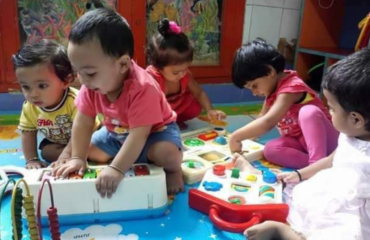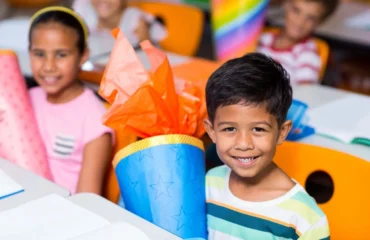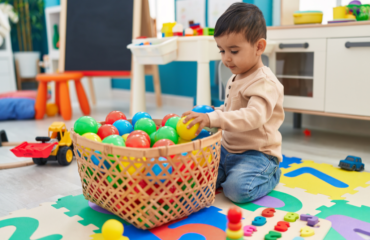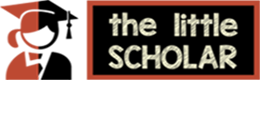
Early childhood is a period of rapid growth, and the ages of one to three lay the foundation for a lifetime of social, emotional, and intellectual development. At Little Scholar School Noida, learning goes beyond the classroom. Preschool activities are thoughtfully designed to shape young minds through an immersive, play-based approach. From reading time and puzzles to physical education, every activity is crafted to spark curiosity, encourage problem-solving, and nurture imagination.
These preschool activities also foster confidence, flexibility, and cooperation, as well as school readiness preparation of preschoolers. Some summer camp activities for preschoolers are preparing them for nature and cooperation, stimulating fantasy and self-expression through art activities, and enhancing fine motor skills and planning through craft activities for preschoolers. All these activities assist in developing a well-rounded mental ability.
The Power of Play-Based Learning
Brain development thrives when young children learn through happy, interactive play that fosters discovery and inquisitiveness. At Little Scholar, imaginative play, such as role play or sensory play with their hands, allows children an engaging way of learning new skills. Projects such as building blocks, puzzles, or manipulating different materials challenge children to pose “why” and “how” questions. Through these tasks, they problem-solve, think critically, and develop critical thinking habits at a very young age.
Story, rhyming, phonics, and daily play not just improve the listening skill but also provide a solid basis for early learning, literacy, and vocabulary. Number games, sort games, and pattern games familiarize the children with the idea of rules of simple numeracy and sequences of reasoning in a relaxing, fun way. Through a combination of these varied, interactive lessons, Little Scholar enables small tots to learn basic ideas about constructive and lively thinking, reinforcing the foundation for long-term educational readiness and success throughout their whole life.
Preschool Summer Camp Activities
Summer camp activities for preschoolers offer a unique, lively learning experience that not only rejuvenates young minds but also stimulates brain development. Little Scholar Summer camps are carefully planned with theme-based, multi-sensory modules that include outdoor discovery, creativity in workshops, and interactive learning. Gardening, mini science experiments, nature walks, music, and dance encourage toddlers to venture outside and learn through action-oriented, process-driven processes.
These tasks make kids responsive to the environment in order for them to be able to observe and record processes for learning to identify patterns, ask questions, and create preliminary scientific concepts. Apart from the above, summer camps also introduce enrichment in language through theme narration and collective cognition, where infants can construct words and commence expressive communication. Timetables, run ahead of time on a “plan–do–review” timetable, offer executive functioning skills of planning, flexibility, and memory.
Work and group games also develop social knowledge and cooperation, enabling children to build adaptability, collaboration, and perspective-taking abilities. Finally, these summer camp activities for preschoolers deliver novelty and pleasure, and integrate significant cognition areas such as reasoning, consideration, and rumination, all via social play.
Preschool Art Activities
Art activities for preschoolers are perhaps the most effective means for sparking imagination and intellectual perception in toddlers. All the toddler art experiences, dance, music, movement, play, drama, painting, and drawing are cleverly blended into the curriculum to give the child the highest possible opportunity to develop.
They are not play but part of achieving a milestone in development. For example, beading with shape or paint facilitates fine motor control and hand-eye coordination. Colour, shape, and pattern manipulation improve visual-spatial ability, the precursor to logical thinking and problem-solving. Symbolic drawing, fantasy play, and storytelling enable symbolic thinking through children’s ability to match movement and mark-making with meaning, skills that underpin adult literacy and numeracy.
Creative expression also helps toddlers to learn and experiment with emotions and become more empathetic and emotionally intelligent. For Little Scholar, art activities for preschoolers are an effective instrument of mental exploration that enables children to learn, imagine, and develop creatively in a structured way.
Preschool Craft Activities
Craft activities for preschoolers offer a delightful method of combining sensory discovery, fantasy, and structured learning, and thus, a precious asset for cognitive development. They introduce sequentially planned activities such as the making of a paper boat, the making of collages, weaving, and a topic activity with a practical activity for Little Scholar.
The activities allow children to plan and sequence their work by collecting materials, taking one step at a time, and incorporating their work, thereby building their organizational skills. The process of production also supports problem-solving, allowing the children to “think outside the box,” re-juggle shapes, and design solutions to unexpected outcomes, hence promoting resilience and flexibility.
Pattern, texture, and symmetry activities, as well as cutting, pasting, and folding, also aid in fine motor skill learning. Meanwhile, thinking in terms of shape and organization is supported by pattern, texture, and symmetry activities. By molding creative thinking into a tangible product, toddlers not only enjoy creating something, but also get to change, think about, and become even more sensitive to cause-and-effect.
The Little Scholar Edge: Rich and Comprehensive Learning
Why Little Scholar is so effective at developing thinking skills through preschool activities is its child-centered, integrated curriculum that goes so much farther than academics. Through play-directed activity, the school builds physical, social, emotional, and intellectual abilities at the same time so that children become adequately equipped for a lifetime of learning.
The environment of activity is very diverse, with an unbelievable array of activities from arts, music, and dancing to craft activities for preschoolers, through outdoor games and multimedia learning, and providing children with numerous opportunities to experiment, explore, and exchange ideas.
Rounding off the atmosphere are sympathetic and supportive teachers who instruct, apart from imparting lessons, every child one-on-one differently, making gradual but definite strides, apart from inducing confidence, curiosity, and creativity. Little Scholar is also provided with a safe, innovation-facilitating campus, one of the most open and play-schooled in Noida, with smart classes, solar-powered devices, and theme-based facilities like gyms, art studios, and even an in-campus swimming pool to facilitate all-around development.
And to make the point stick, parents are being engaged with multiple follow-ups and open communication that actively includes them. This nurturing, supportive context turns all work, everyday school, summer camp activities for preschoolers, art activities for preschoolers, and craft activities for preschoolers into a time of loving learning and brain-enriching.
Taking Cognitive Development out of the Classroom and into the Home
Parents can assist by taking cognitive development out of the classroom and into the home. Simple doodling, collaging, and theme work for preschool children is helpful for imagination-building and fine hand-eye motor control, just as school-grade art activities for preschoolers and craft activities for preschoolers.
Miniature version small summer camp activities for preschoolers are at home in the form of nature walks, story sessions, mini-science, or fantasy role-playing themes. They are miniature versions of preschool summer camp activities that are also helpful for observation, curiosity, and planning. A cycle of planning, acting, and assessing an act develops executive skills such as memory, sequencing, and self-regulation.
Play and play learning with toys, home materials, or outdoors also happen spontaneously, so there is inborn support for problem-solving, exploration, and language development. Parents develop preschool activities through excellent thought-and-play bridging that so naturally extends into the daily life of children, where every minute can be a learning experience.
Play-based learning, summer camp approaches, art activities for preschoolers, and craft activities for preschoolers are developed as preschool activities to foster intellectual growth in infants. These activities encourage reasoning, imagination, language, planning, and control over the motor system in a risk-free, challenging, and stimulating context.
In Little Scholar School Noida, activities are cohesively blended into a well-organized, interrelated curriculum by qualified instructors, state-of-the-art learning facilities, and a wealth of cultural heritage for the development of young minds. Your child’s formative years should be spent exploring, imagining, and discovering. Selecting a preschool that places great value on such preschool activities is the key to active, competent, and inquisitive learners ready to excel at school and in life.
FAQs
1. What are the best preschool activities for cognitive development in toddlers?
Activities such as art activities for preschoolers, craft activities for preschoolers, music, nature walk, fantasy play, and structure games hone cognitive abilities with the help of language, thinking, planning, imagination, and alertness. Play-based learning will be most fruitful during this time.
2. How do summer camp activities for preschoolers differ from an average preschool day?
Generally, summer camp activities for preschoolers are an experience, theme-focused, and intense modality that integrates outdoor adventure, cooperative learning, sensory discovery, and novelty to capture high-level attention domains and solidify planning and automatization of social skills.
3. Do preschoolers’ art and craft activities indeed lead to academic readiness?
Actually, with the construction of fine motor skills, with the provocation of symbol and visual-spatial thinking, with the construction of language in talk, and by establishing confidence. These activities are transferred to early learning blocks, i.e., sequencing, pattern recognition, and expression for early literacy and numeracy.






Absolutely love how this post highlights play as the engine of cognitive growth!
The way hands-on activities like puzzles, role-playing, and building blocks enhance memory, problem-solving, and spatial reasoning rings so true.